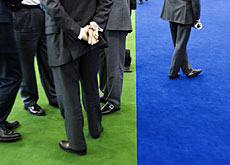Ethical investing emerges from ruins

The financial crisis may have persuaded more Swiss investors to return their money to sustainable funds with an ethical focus, according to market specialists.
Research shows that sustainable funds grew at a faster pace than traditional vehicles last year, leading to the conclusion that investors may be searching for safer prospects after having their fingers singed.
The sustainable investment market places money into ethically-acceptable areas such as environmentally friendly products and in companies that demonstrate social responsibility. Firms that deal in armaments or are perceived to pay excessive bonuses, for example, are screened out of such investments.
Swiss investment consultancy firm onValues calculated that the Swiss market grew more than 63 per cent last year to SFr34.1 billion ($32.2 billion).
Comparing the sustainable and traditional investment markets is a difficult task as they do not follow the same strategies. But a look at funds shows that sustainable assets swelled 54.4 per cent in 2009 while traditionally managed assets grew by only 12.2 per cent.
Part of this increase can be put down to funds recovering from a low point in 2008, but the onValues research also shows new clients now prefer sustainable strategies. Net asset inflow increased nearly 23 per cent for sustainable funds and 4.5 for traditional funds last year.
Staying power
“It is my impression that there is a disillusionment with large financial institutions and that some clients are moving their money to mid-sized players,” Ivo Knoepfel of onValues told swissinfo.ch. “It is no coincidence that these players have the strongest positions in the sustainable market.”
Sustainable investing is no mere trend that will disappear when the markets fully recover, Knoepfel added. OnValues expects the sustainable market to grow at twice the pace of the mainstream funds market in the next few years.
“It has been around for more than 20 years and has a proven track record,” he said. “If you look at the challenges facing the world, such as the environment, energy and water supplies, it is clear that these will be big topics for investors for many years to come.”
It is undeniable that sustainable investing is growing in force with Europe playing an ever increasing role. European umbrella group, Eurosif, calculates that the world market has grown from $2.6 trillion in 2003 to $6.8 trillion (SFr7.2 trillion) in 2008 with Europe’s contribution rising from 16 per cent to 53 per cent.
But analysing Switzerland’s position in the global market is no easy task as different institutions adopt different strategies that are difficult to compare.
Quality and quantity
Switzerland employs the so-called core strategy of screening out a wide range of undesirable practices, selecting companies that display the best social responsibility and allocating funds to themes, such as clean energy production.
Other countries, such as Italy, have a broad strategy approach that screens out only one bad practice or includes firms that agree to engage in dialogue with the asset manager.
Comparing core strategy figures, Switzerland’s SFr34 billion makes more headway against the $511 billion (SFr541 billion) total European market, particularly when considering that Norway alone has $170 billion (SFr180 billion) of assets under management.
Switzerland’s impact is more impressive when you look at the quality of its market, according to Eurosif executive director matt Christensen. Switzerland is one of the world leaders at incorporating sustainable investing into its mainstream market as opposed to an ill-fitting niche product.
“Switzerland has one of the most robust markets with great potential for moderate to high growth,” Christensen told swissinfo.ch. “The players take the issue very seriously and are very innovative rather than following broad trends.”
Conscience vs pocket
One of the biggest growth drivers in Switzerland is the adoption of sustainable investing by the private banking community. For the first time in 2008, private investors overtook institutional giants such as pension funds in the market.
A new generation of entrepreneurs, millionaires and heads of long-standing family fortunes are looking to invest in ethical and sustainable funds.
Sarasin is one of the leading Swiss private banks in the sector, having doubled its sustainable assets under management in 2009 to SFr12 billion. This compares with a 34 per cent increase in overall assets to SFr90 billion.
According to Erol Bilecen, Sarasin’s head of client services in the bank’s sustainable investment division, private investors are far less cautious at the moment than pension funds. And he believes the tide is turning against the perception that sustainable investing means good for the conscience, but poor for the pocket.
“The prejudice has always been that it sounds nice, but when you do something good it comes with a price,” he told swissinfo.ch. “People are now understanding that to get a decent return you have to look at how sustainable your investment is. It is simple investment logic.”
Matthew Allen, swissinfo.ch
Sustainable investing is the management of assets in a socially responsible manner.
This can include anything from investing in green energy and climate-friendly companies and innovations to avoiding stakes in firms that sell armaments or deal with corrupt regimes.
More recently, sustainable investments have shunned companies that are perceived to award executives excessive pay or bonuses.
Large institutions, such as pension funds and government agencies, initially led the way with the sustainable investment drive that is widely seen to have its roots in the late 1980s. In recent years, however, more private investors have joined the cause.
Sustainable investing has grown in popularity thanks to an increasing awareness of environmental problems and public resentment at so-called “fat cat” salaries.
The United Nations established a voluntary programme called Principles of Responsible Investments in 2005. Companies are invited to sign up to the principles to gain recognition for their responsibility towards the environment, society and corporate governance.
Switzerland has 16 signatories to the principles, with the US notching up 31, Japan 11, France 13, Britain 26, the Netherlands 21, and Australia and new Zealand combining with 56.

In compliance with the JTI standards
More: SWI swissinfo.ch certified by the Journalism Trust Initiative





You can find an overview of ongoing debates with our journalists here . Please join us!
If you want to start a conversation about a topic raised in this article or want to report factual errors, email us at english@swissinfo.ch.